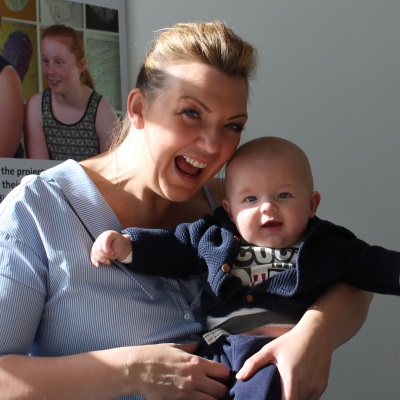Manchester researchers discover BRCA1-linked mechanism
A new mechanism which switches off a gene in families affected by breast and ovarian cancer was been identifier through research co-led by Professors Gareth Evans and Bill Newman and Dr Miriam Smith from the Manchester Centre for Genomic Medicine and The University of Manchester. Known as epigenetic silencing, the research has been published in the American Journal of Human Genetics today. The research was funded by Prevent Breast Cancer and the NIHR.
Rebekah, 26 from Manchester, has a family history of early on-set breast cancer and is from one of the two families where this new variation has been identified. She said:

With such a strong family history of breast cancer, I was always aware that I might be at higher risk. When my mum was told she didn’t carry the BRCA mutation but did have this new genetic change, I decided I needed to know my risk too. Knowledge is power, so I wanted to be on the front foot and have a clear understanding of my own risk of getting breast cancer.
Thankfully, I tested as negative which means that I don’t have a raised risk. Knowing this has changed my outlook; I’m not going to be spending my life worrying about getting cancer – and any kids I later have won’t be at higher risk, either.
Rebekah, from Manchester
Read more about the discovery of the epigenetic silencing mechnanism Manchester BRC website.
Genetic test could give women a more accurate breast cancer risk

New research led by Professor Gareth Evans, Consultant in Medical Genetics and Cancer Epidemiology at Saint Mary’s Hospital, has published findings in the JAMA Oncology Journal on the effectiveness of a genetic test; SNP18, as a more accurate predictor of breast cancer.
Researchers found that when the SNP18 genetic test, combined with mammograms and risk assessment questionnaire, provides a more accurate risk analysis and can accurately identify women who may benefit most from preventive therapy of additional screening.
Read more about the genetic test on the Trust’s Research & Innovation website.
Video gives insight into the future of Cancer Prevention and Early Detection
Professor Gareth Evans, Cancer Prevention and Early Detection Lead, explains how our research will help to optimise screening and preventative strategies for common cancers, with a strong inherited component (breast cancer, colorectal cancer, endometrial cancer, ovarian cancer, prostate cancer and womb cancer).
This research is focused on helping to identify cancer risk sooner, match an individual to the preventive intervention (lifestyle changes and/or chemoprevention) most likely to work for them and, in some cases, may even help to prevent conditions progressing into cancer in the first place.
Reassurance for parents as cancer causing genetic condition risk lower than previously thought
The odds of children having a genetic condition which causes learning difficulties and tumours have been dramatically cut, thanks to genetic analysis led by The University of Manchester and Central Manchester University Hospitals NHS Foundation Trust.
Writing in the journal EBioMedicine, the researchers have identified the underlying genetic mutation which causes neurofibromatosis type 1 (NF1). By RNA testing 361 patients, the researchers were able show that the probability of a child having the severest ‘constitutional’ form of the condition after negative genetic testing is not 6 in 9, but 1 in 9.
Professor of Medical Genetics and Cancer Epidemiology at The University of Manchester and Saint Mary’s Hospital, Gareth Evans, led the study. He said: “The severe form of NF1 can be a terrible illness and to be able to reassure parents that it is less likely that their children will be diagnosed with it will take a significant weight off their shoulders.”
Read more about the NF1 study on the University of Manchester website.


